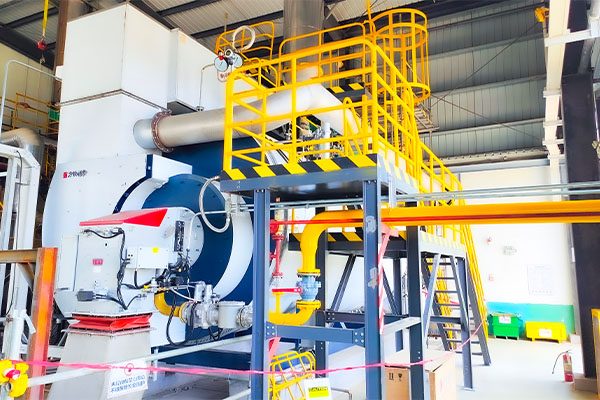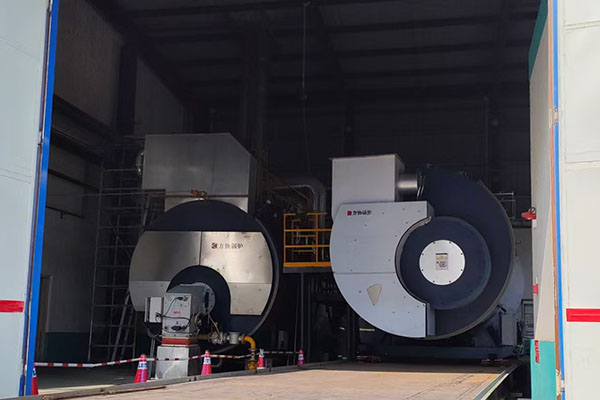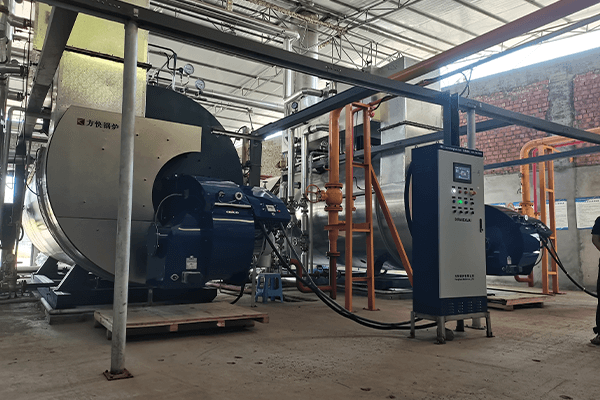A propane gas boiler delivers on-site industrial steam using stored propane—ideal for remote or temporary sites due to high energy density and storage flexibility, but typically costlier and requiring extra safety and logistics; with proper maintenance it can last 15–25+ years.
What is a Propane gas boiler?
A propane gas boiler is an industrial steam-generating unit designed to burn propane fuel (an LPG component) to produce steam for process heating, sterilization, cleaning, and power generation. In industrial contexts, propane-fired steam boilers are often packaged fire-tube or water-tube designs sized to the plant’s steam demand, pressure and duty cycle. Industrial models emphasize robust materials, repeatable control, and simplified maintenance access to meet continuous or batch process requirements.
LPG vs. Propane: What it means for a Propane gas boiler
LPG (liquefied petroleum gas) is a blend of propane and butane; propane is the principal component used for heating in many climates. For a propane gas boiler, LPG supply will be specified as predominantly propane; in colder regions pure propane fractions are preferred because propane maintains vapor pressure at lower temperatures compared to butane. Suppliers will usually state the propane content and vapor pressure behaviour — critical when designing tank vaporizers, regulators and safety devices.
Is a Propane gas boiler better than a natural gas boiler?
Whether a propane gas boiler is better than a natural gas boiler depends on plant specifics. Natural gas offers lower fuel storage complexity and typically lower cost where a pipeline is available. A propane gas boiler, however, provides higher energy density per unit volume and easier on-site storage in tanks—advantages for remote plants, temporary sites, or facilities with unreliable gas mains. From a combustion-control standpoint, modern burners and controls make propane-fired systems as clean and controllable as natural-gas units, but burner tuning, vaporizer selection and safety interlocks must be configured for propane’s different stoichiometry and flame characteristics.
Advantages and disadvantages of a Propane gas boiler
Advantages
-
Fuel availability and portability: a propane gas boiler can run from delivered LPG and stored tanks, reducing reliance on pipeline infrastructure and enabling mobile or modular plant designs.
-
High energy density: propane has greater volumetric energy than natural gas, so propane boiler installations may require smaller storage footprints and less frequent deliveries.
-
Rapid response and stable combustion: well-tuned burners provide fast load-following suitable for intermittent industrial processes and batch operations.
Disadvantages
-
Cost variability: propane is often more expensive per MMBtu than pipeline natural gas in many markets; owners must plan for price volatility and supplier logistics.
-
Storage and logistics: on-site tanks, periodic deliveries, vaporizers and pressure regulation add CAPEX and OPEX compared with a piped supply.
-
Safety and regulations: propane is heavier than air; leak management, ventilation and code compliance (local, ATEX, OSHA) must be addressed for any propane-fired installation.
How long can a Propane gas boiler last?
Industrial boilers, whether propane-fired or otherwise, have lifespans determined by design, materials, maintenance and operating profile. A well-maintained propane gas boiler in industrial service can operate reliably for 15–25 years or more. Life extension depends on scheduled inspections, water treatment to control scale and corrosion, proper burner maintenance, replacement of consumables (safety valves, gaskets), and adherence to statutory pressure-vessel inspection intervals. Operating at design pressure, avoiding frequent thermal shock, and keeping combustion air and fuel systems clean will significantly extend service life.
Get a Propane Gas Boiler Quote
Emissions, controls and water treatment
In industrial operation, attention to combustion efficiency, NOx and CO emissions, and condensate management is essential. Modern low-NOx burners and flue-gas treatment options reduce emissions without sacrificing efficiency. Automated controls — including oxygen trim, modulation and sequencing — match steam output to demand and reduce cycling losses. Effective water treatment (blowdown control, scale inhibitors, dissolved oxygen scavengers and regular testing of conductivity and pH) protects heat transfer surfaces and prevents premature tube failure. Integrating emissions monitoring and a preventive maintenance schedule will help meet environmental and insurance requirements.
Operating cost: Propane gas boiler vs natural gas for industrial heating
Fuel cost comparison requires converting prices to the same energy basis (e.g., $/MMBtu). In most regions where pipeline natural gas is available, natural gas is less expensive per unit energy. But total cost of ownership for a propane gas boiler also includes tank rental, delivery fees, vaporizer losses, and possibly higher maintenance for regulation and leak management. For remote locations with high gas-connection costs, or for temporary/seasonal facilities, a propane-fired steam plant can be economically competitive when connection costs, downtime and reliability are factored in.
Practical considerations for industrial managers
When specifying a propane-fired steam plant, principal considerations include:
-
Fuel storage sizing: design for delivery frequency, temperature extremes and seasonal variations.
-
Vaporizer and pressure regulation: ensure continuous vaporization capacity at peak demand and redundancy for critical processes.
-
Burner selection and control: choose modulating burners and controls tuned to propane’s heating value for high turndown and low emissions.
-
Safety systems: leak detection, flame supervision, automatic shutoff, and proper ventilation in equipment rooms.
-
Integration: confirm compatibility with existing steam headers, condensate return and plant control systems.
-
Regulatory and permitting: local codes often govern tank siting, secondary containment and operator certification.
FAQ
Q: What are typical industries that use propane-fired steam boilers?
A: Food processing, chemical batch plants, textile finishing, remote manufacturing sites, and temporary construction heating commonly use propane where pipeline gas is unavailable.
Q: How does maintenance differ for propane vs natural gas systems?
A: Core mechanical maintenance is similar; fuel-system tasks differ — propane systems require tank, vaporizer and regulator checks plus routine leak-detection programmes and valve servicing.
Q: Can a facility switch from natural gas to propane?
A: Many boilers can be converted with burner and regulator changes and recertification; consult the OEM, a qualified burner technician, and local code authorities before conversion.
Q: What safety measures are most important?
A: Provide well-designed tank siting and containment, flame supervision, redundant pressure regulation, continuous leak detection, ventilation and thorough operator training.
Final recommendation: Evaluate capital and operating costs, site logistics, safety requirements, and long-term fuel forecasts before selecting a fuel strategy. Work with OEMs and accredited engineers to size systems correctly, budget for water treatment and inspections, and implement a continuous improvement plan to maximize uptime and efficiency.
Get your best price
Quickly compare 3 FREE quotes
- Engineer quick quote
- The overall delivery speed is fast
- Financial choice
- Low installation costs and cost savings
25 years+ of boiler R&D
More than 20 innovative technologies



